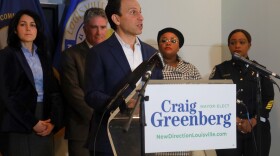The union representing officers of the Louisville Metro Police Department is bucking a damning report issued by the U.S. Department of Justice Wednesday.
After a two-year investigation, the DOJ found LMPD engaged in a “pattern or practice” of unconstitutional and discriminatory policing. But in a statement released late Wednesday night, River City Fraternal Order of Police leadership called the report an “unfair assessment” and blamed any shortcomings on “continued leadership failures by past Louisville Metro administrations.”
“Over a generation of irresponsible political leadership and failed leadership within LMPD, appointed by these administrations, have tarnished the image of what should be one of the premier law enforcement agencies in this country,” the statement reads.
Those failings, according to the FOP, include staffing shortages, high rates of violent crime, and inadequate facilities and training for officers.
FOP leadership also rejected the report’s main assertion — that LMPD has systemic problems with officer misconduct, racial discrimination and accountability.
“Unfortunately, no law enforcement agency is without flaws,” the FOP statement reads. “There have been instances where officers have acted in a manner that is not consistent with the values, ethics, and morals of good policing. … However, there are protocols in place to address those transgressions and officers have been held accountable.”
“We also feel very strong that this report would not go unchallenged and should be dissected for evidentiary value,” the statement continues.
In a statement sent Thursday, the Kentucky State FOP echoed the sentiments expressed by the Louisville police union.
“While the Fraternal Order of Police (FOP) supports common sense justice reform … we know that the picture painted by the report does not represent the men of women of LMPD.”
The state FOP said they disagreed with “some of Mayor [Craig] Greenberg’s statements along with most of the findings contained within the DOJ report.”
However, the statement reads, “We trust that the new leadership in the police department; Mayor Greenberg and members of Metro Council will provide the necessary resources to continue making LMPD one of the premier law enforcement agencies in the country.”
To activists pushing for police reform, the FOP statements are unsurprising.
“It's a blatant refusal of facts,” said Taylor McGovern-U’Sellis, an organizer with The 490 Project, a local group that organizes against police brutality.
The 490 Project is currently advocating for Greenberg to open FOP contract negotiations to the public. Greenberg, who campaigned on promises of transparency, has already begun those negotiations behind closed doors.
“We believe that bringing transparency to this process is going to disinfect the problems of policing,” McGovern-U’Sellis said. “This [opening negotiations] is an easy win for the administration because it doesn't cost extra money, and it doesn't cost extra time.”
Cara Tobe, also with The 490 Project, said it’s important that the reforms outlined in the DOJ report are included in the next collective bargaining agreement, or CBA.
“A lot of the findings that have been outlined by the DOJ actually could be limited by what is negotiated and agreed upon in the CBA,” Tobe said.
Police unions in many other cities under consent decrees have successfully diluted DOJ reforms through use of their CBAs.
Another way police unions shield themselves from consent decrees is to intervene as a third party in the consent decree itself.
490 Project organizer Brian Fields said a move by the FOP to intervene “wouldn't be surprising.”
Fields said a way to balance out the FOP’s intervention would be to have a community group like The 490 Project intervene as well.
“It does show the need for other third-party intervenors so that we can ensure a future for our community — that we have access to constitutional policing patterns where community members are safe, their rights are respected and they have a trust with police,” he said.
Experts say, historically, community groups have struggled to convince courts to let them intervene in consent decrees.






